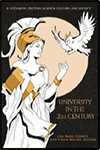
University in the 21st Century
Edited by:
Lisa-Marie Geberth, University of Luxembourg
Lisa-Teresa Woller, Sigmund Freud University
A volume in the series: Unifying Science, Culture and Society. Editor(s): Dominik S. Mihalits, Sigmund Freud University. Brady Wagoner, Aalborg University. Jaan Valsiner, Niels Bohr Professor of Cultural Psychology, Aalborg University.
Published 2023
University has changed dramatically over the last decades. From the spirit of Humboldt, that science in itself is the greatest motivator to study and do research, we experience a shift towards neoliberalism. Studying became part of something one needs to do to compete on a competitive job market. Research gets more and more influenced by interests of those financing research funds. Digitalization changed the way people interact in a university setting.
This book shows different views regarding university: from being a student, becoming an alumnus and then maybe a teacher, challenging views on grading and exams, to problematic patriarchal structures and problems with creating a new study program. Students, alumni, researcher, and lecturers were invited to join this volume and give unique insights into (post-) university life.
CONTENTS
Series Editor Preface — Higher Education Under Social Stress: Pathways to Innovation, Jaan Valsiner. Commentary—University, the Public Intellectual, and the Art of Conversation, Waldomiro J. Silva Filho, Maria Virginia Machado Dazzani, and Giuseppina Marsico. Introduction: The Owl of Minerva, Lisa-Marie Geberth and Lisa-Teresa Woller. PART I: UNIVERSITY AND HER DISCOURSE. Psychology in the Conflict of the Faculties: On the Past and Present of German Psychology Between Academic Freedom and Professionalization, Martin Wieser. Patriarchal Structures in Neoliberal University Discourse: Gender Segregation, Lisa-Teresa Woller. Negotiating Institutional Autonomy: The Accreditation Process Analyzed, Gerhard Benetka and Dominik S. Mihalits. PART II: UNIVERSITY FROM DIFFERENT ANGLES. Between Freedom of Choice and Normative Demands: Students’ Perspectives, Johanna Nitsche, Vanessa Payr, and Céline-Sophie Röde. The Importance to Be Transformational, Daniel Furtner, Sajita Setia, and Michelle Tichy. Value of Degrees: A Need for a New Way of Looking at Higher Education, Enrica Gaetano. Students’ Identity Formation: Becoming Alumni, Natalie Jancosek. “From Theory to Practice”: Transition From University to Work, Maria Gren. PART III: UNIVERSITY AND GRADING. From Examinations as Strategic Communication Arenas to a Critical Reworking of Knowledge, Greta Riboli. Grades as Signs: Knowledge Demonstration and Currency Construction, Alessia Offredi and Federico Guiati. PART IV: UNIVERSITY AND THE NEW CREATIVE PRACTICE. Academic Socialization in the Age of Wi-Fi? On the Affective Ambivalences of E-Teaching and E-Learning, Natalie Rodax and Dominik S. Mihalits. Playful Encounters With Problematic Paradoxes in Problem-Based Project Work: An Impressionist Expeculation in Three Parts, Kathrine Liedtke Thorndahl, Candace Kuby, Patrik Kjærsdam Telléus, and Diana Stentoft. Conclusion: The Disenchantment of University, Lisa-Marie Geberth and Lisa-Teresa Woller. About the Authors.
-
Paperback979-8-88730-178-5
Web price: $45.04 (Reg. 52.99)
-
Hardcover979-8-88730-179-2
Web price: $80.74 (Reg. 94.99)
- eBook979-8-88730-180-8

- EDU015000 - EDUCATION: Higher
- EDU036000 - EDUCATION: Organizations & Institutions
- EDU040000 - EDUCATION: Philosophy & Social Aspects
-
 Digital Developments
Perspectives in Psychology
Digital Developments
Perspectives in Psychology
-
 Expanding the Vision of Faculty Learning Communities in Higher Education
Emerging Opportunities for Faculty to Engage Each Other in Learning, Teaching, and Support
Expanding the Vision of Faculty Learning Communities in Higher Education
Emerging Opportunities for Faculty to Engage Each Other in Learning, Teaching, and Support
-
 Farewell to Variables
Farewell to Variables
-
 Institutional Diversity in American Postsecondary Education
Institutional Diversity in American Postsecondary Education
-
 Personal Truths
Youth Utilizing Artmaking to Promote Diversity, Equity, Inclusion, and Belonging
Personal Truths
Youth Utilizing Artmaking to Promote Diversity, Equity, Inclusion, and Belonging
-
 Promoting Equitable Classroom Practices in Higher Education
Approaches Beyond Curriculum
Promoting Equitable Classroom Practices in Higher Education
Approaches Beyond Curriculum
-
 The Handbook for Aspiring Higher Education Leaders
The Handbook for Aspiring Higher Education Leaders

